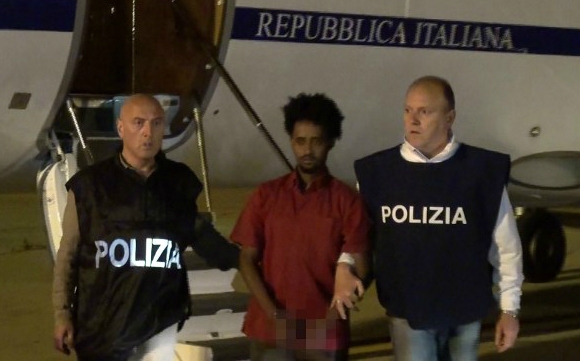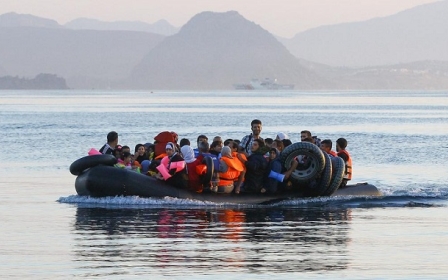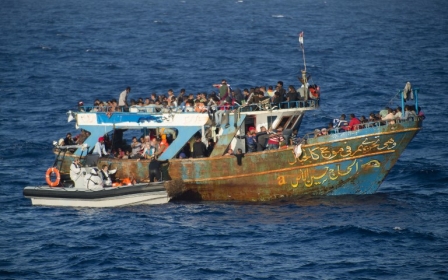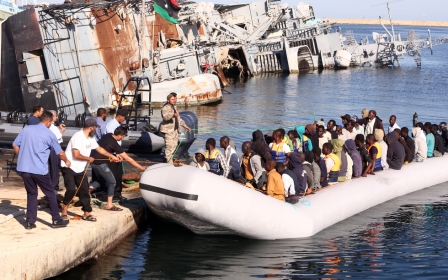Accused people trafficker 'The General' extradited from Sudan to Italy

A notorious people smuggler nicknamed "The General" was set to appear in court in Palermo, Italy, on Wednesday after being arrested in Khartoum following a joint operation involving Sudanese, Italian and British investigators.
Mered Medhanie, a 35-year-old Eritrean who reportedly earned the nickname because he styled himself on former Libyan leader Muammar Gaddafi, is accused of involvement in a sinking off the coast of the Italian island of Lampedusa in October 2013 in which at least 359 people died.
Medhanie was extradited to Italy on Monday following his arrest by Sudanese police on 24 May after British investigators traced him to an address in the El Diem area of Khartoum.
Telephone intercepts gathered by Italian investigators suggested Medhanie was organising both regular Mediterranean crossings and coordinating with people smugglers responsible for land routes and had an extensive network of contacts in the Netherlands and Scandinavia.
"For many years Mered Medhanie was one of the principle traffickers of migrants on the Libya-Sahara line," said Palermo's chief prosector Francesco Lo Voi.
In transcripts published by the Italian La Repubblica newspaper, he is reported to have said: “I have Gaddafi's style, no one can be stronger than me.”
He has been charged with “being chief and organiser of a transnational criminal conspiracy aimed at the smuggling of human beings from Africa to Italy to Northern Europe and the UK,” a statement published by the UK’s National Crime Agency said.
Other charges include people smuggling related to numerous arrivals of boats in Sicily, with aggravating circumstances of the number of smuggled people, inhuman treatment and risk of life to those aboard.
“Medhanie is a prolific people smuggler and has absolute disregard for human life. Although he was operating thousands of miles away, his criminal activity was impacting the UK,” said Tom Dowdall, the NCA’s deputy director.
“Medhanie no doubt thought he was beyond the reach of European justice but we were able to support the Italians by tracking him down to Sudan.
"The intelligence-led operation which resulted in his capture included extensive analysis of communications data, with support from GCHQ [the UK’s communications intelligence agency]. We were also able to use of our international network to broker strategic and operational relationships with the Sudanese authorities.
"The arrest was only possible thanks to substantial cooperation between the Sudanese National Police and the NCA, together with the Palermo prosecutors, the Italian police, the Sudanese and Italian ministries of justice, and the Italian Ministry of Interior.”
A statement published by proscecutors in Palermo revealed some details of how the families of those attempting to reach Europe would be charged for each stage of their journeys, only travelling onwards when payments had been received.
Families would pay large sums for the first phase of the trip across Africa, then again to be transported by sea to Europe in dilapidated boats, and finally to be transported to countries in northern Europe.
On Wednesday, the BBC reported that the man's friends claimed investigators had the wrong man and that there had been a case of mistaken identity.
But Britain's National Crime Agency, which was involved in the operation to arrest the man, has said it was too soon to tell whether or not the claims were true.
'10,000 Mediterranean drownings since 2014'
News of Medhanie’s arrest came as the UN refugee agency said that more than 10,000 people had died attempting to cross the Mediterranean to Europe since 2014, with at least 2,814 people drowning in a spate of sinkings since January this year.
"This is clearly an appalling number of deaths that have occurred in the Mediterranean, just on Europe's borders, just in the past couple of years," said UNHCR spokesman Adrian Edwards.
The EU also announced plans to channel $68bn in funds to countries where migrants and refugees and travelling from in an attempt to stem the flow. The countries identified for funding included Jordan and Lebanon in the Middle East and Ethiopia, Niger, Nigeria, Mali and Senegal.
"We cannot tolerate the loss of life on this scale, we need to do everything to stop it," said European Commission vice-president Frans Timmermans.
Overcrowded boats have been leaving the Libyan and Egyptian coasts with increased frequency since a deal between the EU and Turkey in France slowed the number of people attempting to cross to Greek islands from the Turkish route.
The Libyan coastguard said on Tuesday it had intercepted 117 people, including six pregnant women, on a boat bound for Europe, which they brought back ashore.
More than one million people made the journey to Europe in 2015, the majority fleeing wars in Syria, Iraq and Afghanistan, and a further 204,000 have come since January, the UNHCR says.
New MEE newsletter: Jerusalem Dispatch
Sign up to get the latest insights and analysis on Israel-Palestine, alongside Turkey Unpacked and other MEE newsletters
Middle East Eye delivers independent and unrivalled coverage and analysis of the Middle East, North Africa and beyond. To learn more about republishing this content and the associated fees, please fill out this form. More about MEE can be found here.




